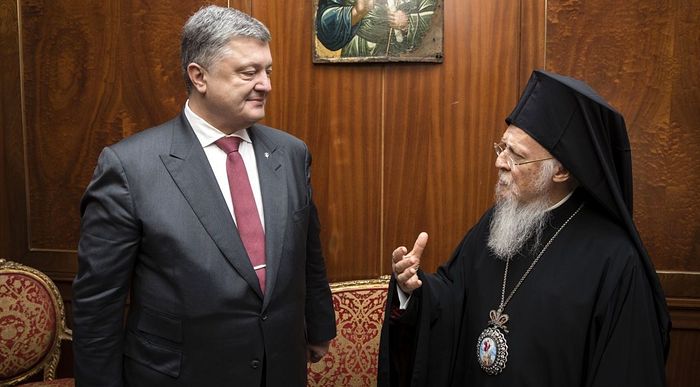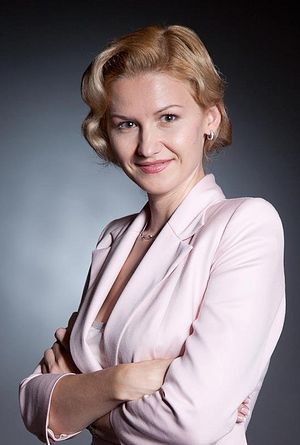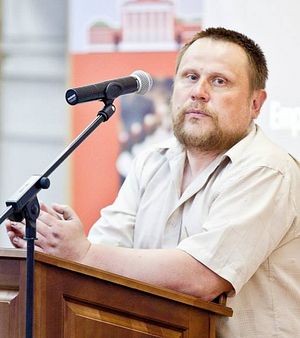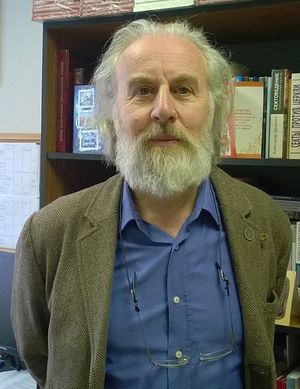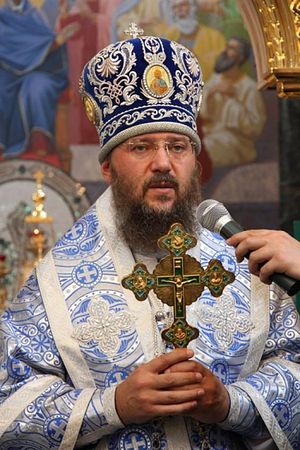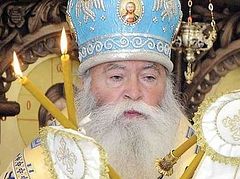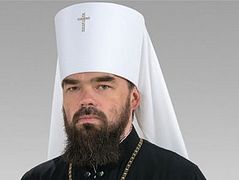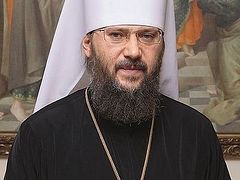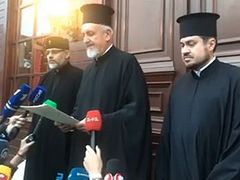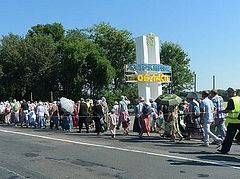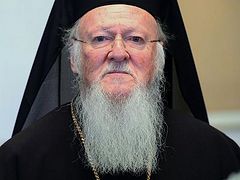Pravoslavie.ru asked clergymen and experts from Kiev and Moscow to comment on last week’s scandalous and shocking decision by the Synod of the Constantinople Patriarchate to revoke the Tomos of 1686 that transferred the Ukrainian Metropolia to the Moscow Patriarchate, and to remove the anathema from the heads of the Ukraine’s uncanonical structures—the “Kiev Patriarchate” and the “Ukrainian autocephalous Orthodox Church”, etc.
“Autocephaly is being supported mainly by those who go to church once a year on Pascha at best.”
Kirill Molchanov, doctoral candidate in political science, vice chairman of the Ukrainian Institute for Analysis and Political Management (Kiev):
—The question of giving a Tomos for a Local Church is not a religious but purely political question. Showing through from behind it is the Ukrainian government’s long held desire to change over to a system of a state Church, which will serve the political powers that be.
This has become one of the main points of President Poroshenko’s pre-election program. In light of the serious social situation in Ukraine today, he can’t feed people with real food and so he has decided to organize a spectacle, appealing strongly to things that are symbolic and sacred. The very idea of autocephaly is supported by no more than a third of the society, while the rest are profoundly indifferent. But the paradox is that those who support it the most vehemently are precisely those Ukrainians who go to church at best once a year on Pascha. The adepts of the Tomos don’t even hide the fact that for them this is a political step towards breaking all ties between Ukraine and Russia. However they are not taking into consideration the fact that this could lead to bloodletting and civil confrontations over the reallocation of church property and raids on churches. The leaders of the country to the contrary are trying to use this theme to sow strife between religious groups according to the principle of “divide and rule”.
“All of this threatens the Orthodox world with very great upheavals.”
Vladislav Petrushko, professor, the Orthodox St. Tikhon Humanitarian University, doctor of Church History (Moscow).
—As I see it, this is on the one hand entirely unbrotherly behavior by one Local Church toward another. On the other hand, it is the manifestation of a tendency that the Constantinople Patriarchate has demonstrated over the past one hundred years of trying to achieve sovereignty over the Orthodox world and receive the status of Constantinople Primate not simply as the first among equals, but as a kind of center of power within the Orthodox world. I am afraid that this is not simply an attempt to encroach upon the jurisdiction of the ROC, but an attempt to show by the example of Ukraine what power the Constantinople Patriarch now intends to seize within the Orthodox world and other Local Churches, intruding upon their jurisdictions, and accepting appeals from those who have been defrocked and excommunicated without taking into consideration the position of the Church that placed them under these interdictions.
Of course all of this is very grievous. We are dealing with not only the violation of Church canons, but with the perversion of the whole of Orthodox ecclesiology. I am sure that the Russian Orthodox Church will not accept this calmly. It can also be expected that other Local Churches will perceive this adequately and express their protest.
After all, a whole complex of Church canons were violated. We know that lately Constantinople has been quite arbitrarily interpreting the 28th canon of the Council of Chalcedon, which gave him the second place in the dyptich after Rome and subjected the lands surrounding Constantinople to its jurisdiction. Now Constantinople as extended that jurisdiction to all the territories where there is no Local Church of their own. He also violated the canon that sets the appeal limit for disputes to thirty years. And now after a little over 300 years, the decision to give the Kiev Metropolia to the jurisdiction of the Moscow Patriarchate has been suddenly revoked. And all of this is being done against the background of an extremely arbitrary report filled with errors and presented at the synaxis at the beginning of September by Bishop Macarius of Christoupolis, about the supposed illegality of the transfer of the Kiev Metropolia to the Moscow Patriarchate. It was perfectly and thoroughly criticized by the Orthodox Encyclopedia. It was conclusively shown that this is collection of errors and unreliable facts, and the report was promptly disavowed, after which it was announced that it will be published in November.
That is, we are seeing that the Synod has already decided in October, but the report will only be in November. Well this is simply some sort of blatant mockery of the entire Orthodox world and canon law. It is total outrage and raidership, to put it in modern terms. You get the impression that Constantinople is no longer interested at all in either historical, real facts, or in the applicable Orthodox canons. It is like in the fable: “You’re only guilty because I’m hungry.”
As we can see, he is systematically carrying out his strategy to acquire hegemony in the Orthodox world. Furthermore his interests obviously correspond to the interests of the United States, which is taking advantage of the situation for its own anti-Russian politics. And Poroshenko is also using it to solve his problem of low ratings just before the elections. As a result we have an absolutely disgraceful outrage: the government meddling in Church affairs, which is against the Ukrainian constitution. On the other hand, the Church canons are being openly trampled upon. And the U.S., a country that considers itself to be a defender of democracy and religious freedoms, is in the most unconscionable way trampling upon freedom of conscience and the principle of non-intrusion in the affairs of another sovereign nation.
This is some sort of postmodernity, which we are now seeing in church life too. It is sad that Patriarch Bartholomew, who is standing on the edge of eternity, instead of thinking about what answer he is going to give to God is getting involved in such things, risking acquiring the glory of Herostratus;1 a man who will leave this life after mixing up everything within Orthodox society and leaving a pile of burning embers behind.
There is also danger in the fact that the situation could become a stalemate after Constantinople legalized the schismatic, anathematized Denisenko. In this case we in general see a unique step. Patriarch Bartholomew, who for over twenty years recognized Denisenko as an anathematized schismatic, suddenly removes the anathema—and that without any explanation. Interesting—what lead him to the opposite conclusion?! And mainly no one even listened to the side that placed this interdiction on him—the Russian Orthodox Church, whose clergyman Denisenko was before going into schism. In the canonical sense this is, again, an absolutely absurd, outrageous and scandalous situation. Forgive me, but not even the Roman pope would allow himself to do such a thing.
However, first of all, whoever enters into communion with a schismatic, according to the Church canons, is considered a schismatic himself. Secondly, if Philaret is after all placed at the head of this very so-called “united church”, they will try to push him on the rest of the Local Churches. If they accept him, the Russian Church will be forced to break communion with them also. This threatens great upheavals throughout the Orthodox world.
In the whole, unfortunately, it is obvious that this will bring great confusion, and not only in Ukrainian society, but throughout world Orthodoxy.
“Constantinople is encouraging the sin of schism”
Elena Dyachenko, political scientist (Kiev):
—The uncanonical lifting of the anathema from the head of the so-called “Kiev Patriarchate” Philaret Denisenko by the synod of the Ecumenical Patriarchate brings schism into Ukrainian society. By this decision Constantinople has shown that not only is the sin of schism no longer condemned, it is to the contrary supported and encouraged. Also alarming are the expectations of receiving the so-called Tomos—both the radicals and the representatives of the “Ukrainian Orthodox Church Kiev Patriarchate” have announced that they will begin confiscating churches, monasteries, and other property from the canonical Ukrainian Orthodox Church, and representatives of the war party in parliament are actively pushing a bill to deprive the UOC of its status and legalize the seizure of its property.
But the worst thing that could happen is not even the reallocation of property, but the resistance of the faithful. The radicals are whipping up threats to seize the Kiev Caves Lavra, and the faithful from all over the country are ready at any moment to come and protect this and other holy sites. It is possible that this is precisely the aim of those who are initiating this provocation—a large gathering of people near religious edifices. This scene would be advantageous to the government—then the pro-government candidate for the presidential elections can offer himself to society as a fighter against the “aggressor”. It is not important to him that the “aggressor” will be the parishioners of the largest Orthodox confession—the UOC. For the UOC itself, last week’s events do not change anything—I am sure that the majority of the parishioners will stay with it and its primate, His Beatitude Metropolitan Onuphry. People are ready for such a test of faith.
As I see it, the interests of the head of the “UOC KP” Philaret and the government as the initiator of the creation of a united local church have now also departed ways: For him the project of a united church will turn out to be a demotion in the best case, and in the worst case the loss of his status as “patriarch” and 5000 parishes across the country. It is hard to say that the head of “Ukrainian Autocephalous Orthodox Church”, Makary, was voluntarily drawn into to the project of a united local church. Neither is he being considered for the position of head of the “United Orthodox Church” and he will lose more from the project than he had before it. This is now a schism amongst schismatics. We see that Constantinople is also not rushing to give the Tomos of a united Orthodox church, and is demanding impossible conditions—for example, the unity of the UOC, the “UOC KP”, and the “UAOC”, as Philaret announced last week. In this situation, the very idea of a Tomos is leveled—they asked for independence, but they turned out to be more dependent than they were before. I can suppose that the Phanar, suddenly positioning itself against all of world Orthodoxy, has found itself in a very difficult situation, experiencing powerful pressure from the U.S. State Department. Therefore the lifting of the anathema instead of granting the Tomos could very well have been a compromise and buying of time for the Ecumenical Patriarch.
It looks as though using the idea of the Tomos as a part of his pre-election campaign will not work out for the president. Faith, the army, and the Church were his pre-election promises in a situation where he has absolutely nothing to say on the real current agenda—ending the war and the struggle with poverty. Now he has nothing to say on these three contrived promises either. I do not exclude the possibility that the lifting of the anathema will be a substitute for the Tomos, just as the simplification of the visa rules [for Ukrainian citizens to visit EU countries] was in its time presented as a substitute for the failed promises to enter the EU. I would like to hope that neither the Tomos, nor the lifting of the anathema will be used as a green light for the seizure of churches from the canonical UOC and does not become the start of a religious war among the Orthodox of the Ukraine.
“Announcing one’s rights to a territory does not mean knowing how to deal with it”
Andrei Rogozyansky, commentator (Moscow).
—It seems to me that a certain overexcitement now reigning in the Phanar, along with the propagandistic pathos of rhetoric on primacy and its extraordinary possibilities acted upon the signatories of the communiqué, the members of the synod of the Ecumenical Patriarchate. They were caught up in the sheer scope of the issues they were discussing, in how freely they were penetrating into the depths of the centuries, pronouncing judgment on whole historical epochs. Well this, forgive me, “creative” approach and this self-willed historiosophia shows that an enormous abyss lies between the real religious life of the Ukraine and this country’s problems and the worldview of the Phanar’s wise men through their intellectualism and the chamber mentality in the meetings held there.
The decision by the Constantinople synod awaits a stern evaluation, both moral and canonical. I would like to direct your attention to the organizational side. What Patriarch Bartholomew has set in motion is something that no one has done before, ever. No one knows yet what happens when an anathema is suddenly lifted [by a Church that is not the one who placed it.—Trans.], and a decision that was made 400 years ago is suddenly revoked; when outsiders come to another country, to terra incognita for them, and takes up the reins over the process of creating a new, all-encompassing Church jurisdiction.
Emotions have not yet cooled; everyone is discussing the contents of the Ecumenical Patriarchate’s announcement. But we can’t think that because of October 9–11 the world itself around us has changed, or that this is something so simple—just to up and correct history. On first take it could seem that the Constantinople synod has decided something, or achieved something. But essentially, the main thing is that Constantinople has made its bed and now it has to lay it in—it has saddled itself with the building of a new Church structure in Ukraine; which will most probably become a very, very complicated “asset” for it.
Without having gathered together the Philaretites and the parishes of the “UAOC” into a unified structure on a specific, understandable platform, without having managed to achieve a stable leadership, a solution to the problem of property, discipline of the clergy, and so on, Constantinople cannot go on endlessly with its strident rhetoric. The situation in which the Ecumenical Patriarch supposedly possesses exclusive understanding and rights, but at the same time in fact rules but a very small jurisdiction that is scattered across continents, has possibly given him certain advantages as a sort of distinguished theoretician. The self-assurance with which the Phanariotes discuss “nominally” Orthodox Russia, in which supposedly the flock of Patriarch Kirill is not really that large, is the result of this detachment from real life. The Ecumenical Patriarchate practically doesn’t have its own canonical territory, but oversees a diaspora. Everywhere present, he abides nowhere; being occupied with everyone, he basically answers for nothing. The skeleton of the Constantinople bureaucracy is occupied its whole life with conducting various forums, meetings, consultations on the ecclesiastical-diplomatic level, and preparing documents with theological explanations. The cares and difficulties of a Local Church are unknown to him. Now a new period is opening up, in which the Constantinople Patriarchate with its 3200 parishes all over the world is trying to swallow up, or at least perform a certain transformational mission within, the Ukraine—a large country where today the number of active parishes approaches 20,000.
It is understandable that regardless of Constantinople’s rights, historical documents, canons, and so on, such a situation looks rather peculiar. To be frank, Constantinople is rejoicing too soon over it. Ukraine is now in transition; it is not some an average country—its political and governing culture is up against a whole calendar of screaming problems, and succeeding here is a task that is profoundly not banal.
Proclaiming your rights to a territory does not mean being able to deal with it. In a year or two the proclamation of the Constantinople Synod, announced on October 11, will start to be looked at in another light, in connection with concrete results, talents, and the lack of specific people drawn into the process. Phanar’s viability in the reconstruction of the Ukrainian religious sphere should be confirmed. If this construction of a new Kiev-Constantinople metropolia does not work out, the pathos of the “Mother Church” will likewise fall by itself, and become overgrown with contemptuous connotations.
Now we are observing how Patriarch Bartholomew comes with inexpressible pomp into Ukrainian church affairs and takes upon himself such exclusive responsibility, not shared with any other of the existing jurisdictions in the country or with any influential figure. This turns the Ukraine into a general exam for him. Any unforeseen and negative consequences will be momentarily written onto his personal account. He will personally become the guilty party to any misfortunes. The debunking of his false omnipotence will turn out to be extremely painful. It will in all probability have an effect on his future place and role in the system of Local Churches.
The Phanar’s latest decisions will bring additional insecurity into the Ukrainian situation. They will destabilize the schismatic “UOC KP” and the “UAOC”, which up till now have for better or for worse been ruled centrally, had their own permanent staff, stable financial income and expenditures, and other similar necessary attributes. Now, however, with the reformation in the structure of the Ecumenical Patriarchate, a new marketplace of vacancies and ambitions, often radical and eccentric, is literally being thrown open to them. Anyone and everyone will start looking at the formation of a “United Local Church” as a window of opportunity for himself personally. Considering the popularization of opinions in the Ukrainian political space, the differences in programs and views of the past, and the passions around election time, the establishment of a “United Local” promises not to be boring. In all probability we will see a clash of interests—a display in church spheres of divisions that are characteristic for Ukrainian society as a whole. Patriarch Bartholomew’s new flock will show itself to be a rather unsettled acquisition.
As for the Ukrainian Orthodox Church—the Phanar’s latest decisions impinge upon it, but in my view not as strongly as it could have been. The situation of canonical Orthodoxy will become complicated; after all, the Phanar now officially recognizes the schismatics. But the greatest threat to the UOC was the momentary, quick granting of the Tomos, for example to the self-proclaimed “Kiev Patriarchate”. This is what President Poroshenko has been leading up to, and it has to be admitted that under certain circumstances events could have developed in that direction. Now it turns out that to the contrary—the days of the “UOC KP” and the “UAOC” are numbered, and out of them something is supposed to emerge in the future, which possibly (!) will become the united national Local Church.
The blitzkrieg project of autocephalization will enter a prolonged, routine phase. The unification pathos will of course be officially upheld, but in fact more strength will be required for the discussion of contentious organizational points.
As long as the question of the re-formation of schismatic structures occupies the central place, questions of the status and future of the UOC will be relegated to a secondary position. Even the wavering part of the clergy and parishioners will not rush over to a newly created venture that is under foreign control and has unclear parameters.
Some reflections on the decision of the Synod of the Church of Constantinople on 11-10-2018
Alexander Dvorkin, Professor of Church History, Saint Tikhon’s Orthodox University:
Last week’s decision by the Synod of the Church of Constantinople, lead by the Ecumenical Patriarch Bartholomew, to remove the anathemas on Philaret (Denisenko), and Macarius (Maletich) is rooted in the claims of Constantinople of their alleged right to hear and review the appeals of clerics of the Local Orthodox Churches across the entire world.
“To accept and review the petitions of appeal of Philaret Denisenko and Makary Maletich and their followers who found themselves in schism not for dogmatic reasons, in accordance with the canonical prerogatives of the Patriarchate of Constantinople to receive such petitions by hierarchs and other clergy of all the autocephalous Churches”2
Our Canon law experts and theologians have already written quite a lot, and convincingly, that no councils ever gave such a right to the Ecumenical Patriarch. The existing precedents of his interference in the affairs of other Local Churches are either based on the Imperial politics of Byzantium (i.e. on the will of the Emperor), or on the difficult situation in the Ottoman Empire, where by the will of the Sultan (and contrary to the Canons), the Ecumenical Patriarch was placed as chief over all Orthodox Christians.
In both cases, these circumstances are not relevant or applicable in today’s world. In my brief response, I will not repeat the arguments which have already been said before, but I will demonstrate that Patriarch Bartholomew allows a considerable excess of even self-appointed powers, and acts completely arbitrary and anti-canonically.
And so it is, that the only Bishop, for whom our canon law recognized certain extraterritorial functions is the Bishop of the first Imperial capital—the city of Rome. According to the third, fourth, and fifth canons of the Council of Sardica (344), later confirmed by the Council in Trullo (Quinisext Council, 691-692), a bishop who did not agree with the decision of his ecclesiastical court, had the right to appeal to the Pope as the final instance of appeal.
However, even if the appellant is supported, the Bishop of Rome cannot overrule the previous decision. The most that is included within his authority is to purpose the gathering of a new council in a region/province adjacent to the one in which the first decision was made. He can send his legates to this new council, so that they can present his point of view to those gathered. Nothing more, nothing less.
This right of the Pope is recognized by the whole Church, and if it comes to pass, that the Bishops of Rome return to Orthodoxy, they would again become the highest place of appeals, as it was put forth in the canons.
The Ecumenical Patriarchate claims that since it is the “New Rome”, all the rights and privileges of the “Old Rome” apply to it. But even in this case, if we accept this argument, it is still a unilateral declaration about removing the anathemas from the Schismatics Philaret and Makary, exceeding all conceivable rights and privileges. The 121st Canon of the Council of Carthage says:
“So that none of us place ourselves as Bishops above other Bishops, and do not establish a tyrannical terror in order to force our brothers to obey.”
And in the message of the African Council to Pope Celestine it says:
“Can anyone believe that our God would give the truth/right of judgment to one person alone, and refuse to the many other priests gathered at the council? And will there be a court in a different region that is at all grounded, where all the needed personalities of the witnesses, either by physical weakness or weakness of old age, or many other obstacles, be unable to produce themselves?”
It seems as if those lines were addressed directly to Patriarch Bartholomew. And so it’s obvious that, in making this decision, he violated even his own incorrect and extremely whimsical interpretations of church canons, that is to say, he acted strictly anti-canonically. And this cannot be justified by anything.
The argument that in this way, he led to the unity of the brethren in schism does not work. Those brothers always had the opportunity to return to the One, Holy Catholic, and Apostolic Church.
With his current anti-canonical decision, Patriarch Bartholomew deprived them of that opportunity: “Why should we return somewhere, if we are already a recognized Church?”
2. In his decision, Patriarch Bartholomew announced the “restoration” of Denisenko and Maletich to their ecclesiastical rank(s) during the moment of their anathematization:
“Thus, the above mentioned have been canonically reinstated to their hierarchical or priestly rank, and their faithful have been restored to communion with the Church”3
Accordingly, in agreement with this decision, Philaret again became a “Metropolitan”, and Makary became a “priest”.
Nothing was said about them being received in “their existing rank(s)”, or about the actual validity of their ordinations. According to this decision, this question remains open for now. By the text of the decision of the Patriarch of Constantinople, the Kiev Cathedra is considered still vacant, and is under the direct control of the Ecumenical Patriarch himself.
“To reestablish at this moment the stavropegion of the Ecumenical Patriarchate in Kiev—one of its many starvropegion in Ukraine that existed there always…4
And its “Primate” would be elected at the founding council, confirmed by the Phanar, and then a Tomos on autocephaly would be received.
However, at the very first briefing after the resolution was issued (which was confirmed by his press service) Philaret Denisenko claimed that Patriarch Bartholomew recognized the de facto autocephaly of the “Kiev Patriarchate”, and that the “starvropegion” is merely the representation which he intends to open in Kiev, before legalizing them as the “Ukrainian Orthodox Church”.
Moreover, Philaret proclaimed that he was accepted into communion, and legalized in his “existing rank” as a Patriarch: “I was Patriarch, I am Patriarch, and I will remain Patriarch”, he said; In the same way, he said that all sacraments conducted by him, including all ordinations were legalized.
In the resolution of Patriarch Bartholomew, it says nothing of that kind, no matter how broadly you try to interpret it.
The same idea was repeated in the statement of Petro Poroshenko, uttered for some reason in the middle of an airfield.
Patriarch Bartholomew cannot be unaware of these statements. They are clearly contrary to what was said in the documents signed by him.
He has two options: to either immediately refute them, and urge the “interpreters” not to distort the content of his Synod’s decree, or to remain silent, and thereby show that he is only a weak-willed tool in the hands of political masters.
And as a final observation, during last week’s briefing, Philaret Denisenko gave an amazingly open definition of the tasks and goals of the Ukrainian “Church”, created at Istanbul’s decree:
“We want the Ukrainian Church to serve the Ukrainian nation, to protect the Ukrainian state from external enemies.”
Not one word about Christ, not one word about the Kingdom of God.
So what kind of structure is Patriarch Bartholomew trying to create?
“We were, are, and will remain the only canonical Church in Ukraine.”
Metropolitan Anthony (Pakanich) of Boryspil and Brovary, chancellor of the Ukrainian Orthodox Church:
What happened at the Synod in Istanbul yesterday shocked the entire Orthodox world. It seems the Patriarchate of Constantinople is consciously embarking on a path of schism in world Orthodoxy. Patriarch Bartholomew ignored the calls of the Local Churches to convene a meeting of the primates to work out a common and conciliar solution to the Ukrainian Church issue and unilaterally made very serious but erroneous decisions. I hope the Orthodox world will give this action an objective evaluation.
The final document of the Constantinople Synod raises more questions than it gives answers. In particular, the status of the UOC-KP and UAOC remains unclear. What was the procedure for considering Philaret Denisenko’s appeal? Many other questions also arise.
In reality, nothing has changed for our Church. We were, are, and will remain the only canonical Church in Ukraine. We will not recognize the stavropegion, the creation of which was proclaimed at the Phanar. Having received the schismatics into communion, Patriarch Bartholomew did not make them canonical, but has himself embarked on the path of schism. The schismatics remain schismatics. They did not receive any autocephaly or tomos. It seems they have lost even that independence, although non-canonical, that they had and which they always emphasized.
The time has come for all of us to strengthen our prayers, remembering that the truth of God is invincible.5

